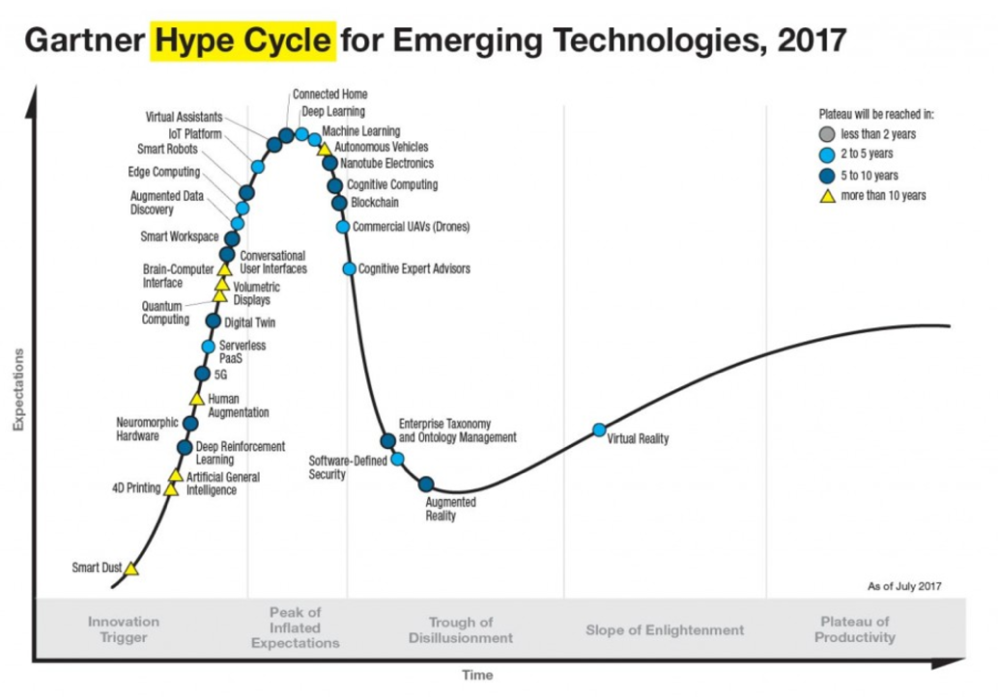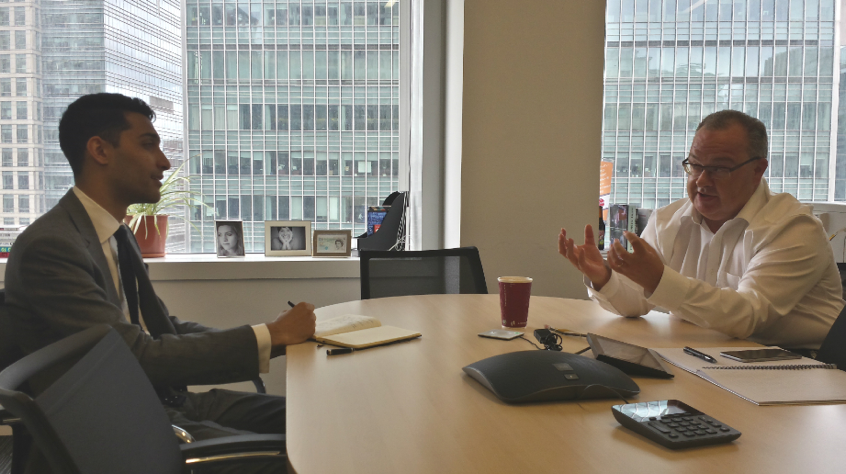
February 23, 2018, by Carla
Emerging Technologies: Interview with the CTO of Thomson Reuters
By Mirae Tejura, second-year student, studying management
When many of us think of emerging, futuristic technologies, we picture driverless cars, personal robot assistants, voice-activated everything. Heavy research and development in the driverless car industry suggests this soon may be a reality.
We are still in the early stages of learning, creating and exploring what we can do with the capabilities such as artificial intelligence, machine learning, blockchain and big-data science. It will be our generation that will take over this industry and push it further.

Gartner’s 2017 hype circle for emerging technologies
I sat down with John Finch, chief technology officer, financial and risk at Thomson Reuters – a provider of data, information and insight to global professional industries – to get his opinion on how he believes emerging technologies will affect undergraduates and the jobs we apply for.
John has a wealth of experience, previously the chief information officer at the Bank of England and Experian before that, and a council member of the University of Nottingham.
John also recently wrote an interesting article on blockchain and BlockOneIQ, so I think it is safe to say it’s worth paying attention to his opinions in this field.
There were three key pieces of advice John gave me about how as an undergraduate, I can position myself in any industry to be prepared for the technological disruption that has already begun and – as historical data suggests – will exponentially grow.
3. Firstly, pass your exams
It may seem obvious– it did to me – that if you are at university, you have to pass your exams, otherwise it makes the past three years plus redundant. However, there is more to this. It isn’t solely about regurgitating textbooks of information onto an exam paper. It is about the principle of showing you are able to apply yourself to problems when you need to.
This may be best illustrated with one of John’s examples. At the moment, we are at a period of uncertainty – a tipping point. This tends to put people on edge from the fear of not knowing what might happen next. The tipping point is demonstrated by Thomson Reuters’ revenue of £0.8bn from machine consumption of their data feeds, with 6% growth being greater than the human consumption of their data feeds on traditional desktops. Passing your exams shows that you are able to adapt to a situation and learn how to operate in a new market or environment.

2. Collaborate and engage in team activities
Success is not down to an individual. John mentioned the importance working together. He admitted his success is down to working with other people who then collaborate with others, and so on. He said:
“You will succeed if others succeed.”
This shows that no matter what position or stage you are at in your career, it is imperative that you collaborate effectively. The days of the lone rangers – the Steve Jobs and Mark Zuckerbergs – are no longer. In today’s market, a team of individuals, with a range of experience, bringing different ideas to the table, are more likely to succeed and innovate.
3. Globalise yourself
Experience and engagement abroad adds tremendous depth to your character. You need to see much more of the world to understand the cultural implications of these emerging technologies. We are part of what is known as the ‘Second Machine Age’. The ‘First Machine Age’ worked along-side humans to help improve efficiency. The ‘Second Machine Age’ is about augmenting human labor with machines. A frightening thought for some.
Corporate governance expert and social influencer in Risk, David Doughty believes that there is going to be a re-skilling of jobs. This is because artificial intelligence will introduce new ways of looking at data to highlight different ideas.
Don’t want to be left behind? Global experience proves you are able to adapt to different environments and therefore easily adapt and learn about different business cultures globally. Overall, this change and shift in all industries is not something that can be ignored. What is important is how you react and what you start doing now to prepare yourself for it.
Want to learn more about emerging technologies and the future of work? Check out our post on the Fourth Industrial Revolution here. Starting to thinking about your career? Book an appointment to talk through your options with one of careers advisers.
This article was first published on LinkedIn here.
Previous Post
What Is the Internet of Things?No comments yet, fill out a comment to be the first

Leave a Reply